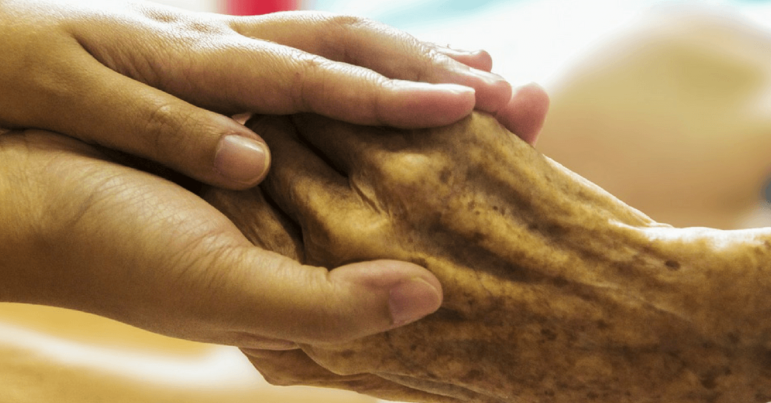When asked where they want to die, 80% of Americans say they would like to die at home. For many years, palliative care doctors have tried to help patients with advanced illness leave the hospital and have a peaceful death at home. But some doctors are realizing that we don’t have the structures and help for home caregivers necessary to support this growing trend.
This realization was what drove palliative care doctor and filmmaker Jessica Zitter to create the documentary “Caregiver: A Love Story.” The film follows couple Bambi and Rick as they navigate the joys and challenges of trying to give Bambi a “kinder death” at home.
This raw and emotional film shows Rick’s journey as primary caregiver: his sense of duty to take care of his wife, his frustration at not having help, and the impact on his health. As much as Rick feels “thrust into the role” and unqualified to provide this level of care, he doesn’t see an option to stop because of the love he has for his wife. “Why am I doing this? It’s all about love,” Rick says. Yet this takes a toll on his physical and mental condition, and he feels his health is “deteriorating with hers.”
Dr. Jessica Nutik Zitter practices critical and palliative care medicine at a public hospital in Oakland, California. She is the author of Extreme Measures: Finding a Better Path to the End of Life and her work was featured in the film EXTREMIS, which was nominated for an Oscar and two Emmys. We spoke with Dr. Zitter about the film and why they are trying to get as many clinicians as possible to watch it.
To watch the film, check out the full list of screenings. Clinicians who are members of Docola can watch the film and attend a Q&A with Dr. Zitter on January 26th.
Lown Institute: Where did the idea for this documentary come from?
Dr. Jessica Zitter: We originally were making a film about how getting out of the hospital was a good thing, it was not intended to be about family caregiver burden. But when we reviewed the film, we recognized that Rick’s story really needed to be told, not just Bambi’s. We needed to share the voice of people like Rick taking care of loved ones at home, work that is not usually given attention.
What do you hope that clinicians take from the movie?
I hope that clinicians will lift their heads out of the hospital and understand that the hospital is not the limit of their responsibility. For me it was a shock to watch my own movie and realize I was sending people home without any knowledge of what they were up against. I was setting them up for failure when I could have had an impact. Hospitals are used to focusing on the patients inside the hospital, but not very good at looking at the patient as a person that lives outside the hospital too. Even those in palliative care are missing something.
We need to start to think about creating a structure that provides support to the people we treat, not just kick them out of the hospital. We shouldn’t be the “hospital on a hill,” siloed off from the rest of the world. This will just make things worse for people.
How can hospital clinicians better support family caregivers?
Hospitals have the responsibility to identify caregivers while patients are in the hospital and direct them to resources, so they’re not going out blind. Caregivers should be connected to resources like Meals on Wheels, hospice, respite services, support groups , educational programming, and adult day care centers. We should have a follow-up mechanism, so that clinicians at the hospital aren’t depending on caregivers to reach out if they need help (caregivers are often too overwhelmed to do this).
How is the health of caregivers being impacted by the move from hospital to home?
Caregiver burden is one of the rising silent epidemics in our time. In 2017, more people died at home than the hospital, but we’re not shifting support outside the hospital. As people are leaving we’re not supporting them or their caregivers. All of these caregivers are having to leave the workforce, and many more women than men leave the workforce. That’s tens of billions lost because caregiving itself is a full time job but we don’t pay for it.
There are profound consequences for caregivers of doing this job unsupported and untrained. There are very high rates of depression and loss of financial security. Family caregivers don’t take care of themselves; they forgo their own care. You see this in the film very powerfully.
Do you have advice for patients or caregivers who are feeling overwhelmed?
A lot of people don’t realize that they are family caregivers or that they need help. This film, if nothing else, mobilizes a movement. We are creating a program for the film specifically for family caregivers, as a first step to help them find resources within their community.
